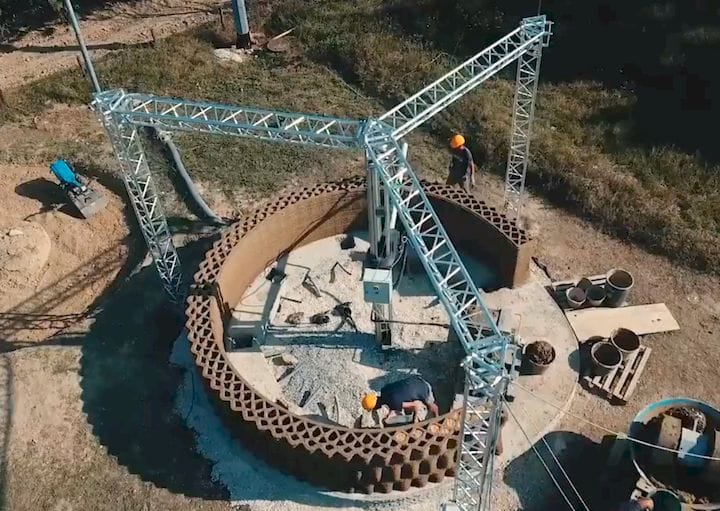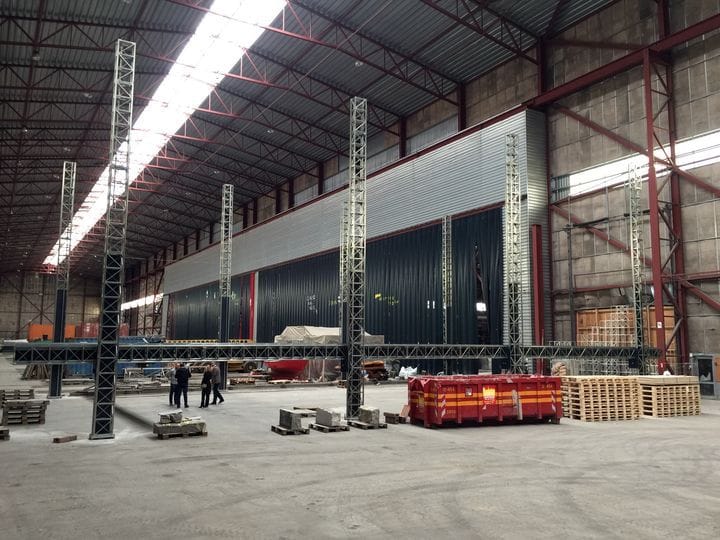![The Crane WASP construction 3D printer [Source: WASP]](https://fabbaloo.com/wp-content/uploads/2020/05/image-asset_img_5eb0a698e9188.jpg)
The WASP Project is set to announce a large-scale construction printer.
WASP have been making highly unusual 3D printers for more than five years, specializing in materials like clay. Now the expertise they’ve gained on all their prior projects is being put together to create what they call the “Crane WASP The Infinity 3D Printer”.
It’s a construction 3D printer that extrudes “natural materials and cement mortars”, with which they are very familiar. The device is designed to print the structure on site, rather than in a factory and ship pre-printed parts to the building site. Thus the machine is also transportable, although it appears that it would involve some effort to do so.
![It looks like it could be a bit of work to move the Crane WASP construction 3D printer from site to site [Source: WASP]](https://fabbaloo.com/wp-content/uploads/2020/05/image-asset_img_5eb0a69953eff.jpg)
Support structures are still an obvious problem with this approach.
Here we see an image of how they approach the window problem. Evidently they pause the machine and insert a solid block to form the bottom of the window opening, and another to hold up the material above, which otherwise would fall catastrophically.
![How to create a window opening with a construction 3D printer [Source: WASP]](https://fabbaloo.com/wp-content/uploads/2020/05/image-asset_img_5eb0a699a293e.jpg)
I’m fascinated to watch how WASP has progressed to the Crane. They began with small devices extruding thermoplastic or clay, with the intent of having local printing for developing countries. Their desktop equipment made way for larger machines, including their massive delta machine.
Now the Crane takes a big step forward by combining all their knowledge together in a modular system capable of 3D printing buildings, or at least the walls of a building.
In their introductory video you can see their approach: 3D print a sparse structure, and then fill the void with insulative material. This speeds production of the walls and likely lowers the costs as well.
The material used is intended to be locally sourced at “0km”, with the addition of fibers to ensure strength. WASP explains that the materials used in the single “module” can be “cement, bio cement, natural dough”.
That last item suggests building sized cakes, but I’m not sure there is an oven large enough to cook it.
![The Crane WASP construction 3D printer extruding building material [Source: WASP]](https://fabbaloo.com/wp-content/uploads/2020/05/image-asset_img_5eb0a699ef0cf.jpg)
WASP says it will be possible to deploy a series of Crane devices to operate simultaneously to produce larger, more complex structures.
![The modular concept of the Crane WASP construction 3D printer [Source: WASP]](https://fabbaloo.com/wp-content/uploads/2020/05/image-asset_img_5eb0a69a496c5.jpg)
While their video shows the printing of a cylindrical building, one can imagine their mechanism being able to 3D print other geometries by maneuvering the crane appropriately.
WASP has not yet released the machine for purchase, but intends on performing a live demonstration of the machine on 6-7 October near their headquarters in Italy.
A Google Earth view of the site shows a previous large-scale construction 3D printing experiment.
![Satellite view of WASP’s construction printer testing area [Source: WASP]](https://fabbaloo.com/wp-content/uploads/2020/05/image-asset_img_5eb0a69a9a399.jpg)
Construction 3D printing should eventually be a significant process, but as yet we’ve seen only experimental ventures in the area. Now we see a company that has literally years of experience printing construction-style materials and large-scale 3D printing.
This could be the start of something very interesting.
Via WASP











COBOD’s BOD2 construction 3D printer seems to be catching on as the company has made multiple sales of the new device.